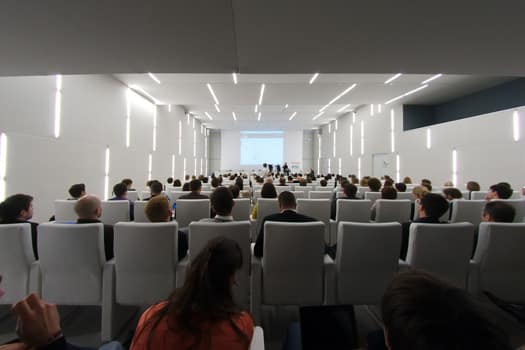Conference Execution As Attendee Learning
Most conference organizers believe that the delivery of information in an efficient, timely, productive manner is the key to attendee satisfaction, success and financial stability.
We focus primarily on the efficient execution of delivery of content.
But in today’s knowledge economy, that is not enough. The focus on controlling information flow, creating a one-way and top-down hierarchical pre-planned well-executed logistical conference experience won’t cut it. The conference mind-set that mandates efficient execution actually inhibits innovation and attendee learning.
Executing Efficient Information Delivery
Concentrating on flawless execution of delivery of information crowds out the experimentation and reflection vital to sustainable success.
A focus on improving the distribution of content through chosen speakers in an efficient and speedy manner is the wrong focus. The best system of delivery of information has already happened. It’s called the internet.
This focus on speakers talking at attendees inhibits attendees’ ability to learn and innovate.
Execution as Efficiency
What’s wrong with a conference focus on execution as efficiency?
It is based on a notion that attendees are cogs in a production system. They can be controlled. It’s grounded in an outdated factory model of management that workers are easy to monitor and measure their output.
When execution of efficient information delivery is the primary goal:
- Speakers provide the answers.
- Attendees follow a prescribed set of instructions from the speaker.
- Feedback to attendees is nonexistent.
- Problem solving is rarely required.
- Attendees are not to provide their insights, experience or judgments.
- When in doubt, attendees are to ask speakers how to do it.
- Fear of failure diminishes attendees’ ideas about context and application of content.
Promoting Long-Term Success
Instead of a focus on delivery of information, conference organizers should focus on attendees’ learning and retention. When the focus shifts from distributing content through speakers, to attendees’ making meaning of the content and memory retention, then the conference focuses on real long-term change.
Then attendees’ begin to embrace that life-long learning and on-the-job application of conference.
Collaboration, cross-department communication, problem solving and peer-sharing become the goal. Attendees come to a conference to learn, not just absorb information from a talking head. They have real world-problems they need to solve and are looking for like-minded peers to discuss with and collaborate.
Execution As Learning
When execution of attendee learning is the primary goal:
- Speakers set the direction and facilitate conversations on specific topics.
- Attendees discover answers; make sense of the content; and share experiences together in pairs, threesomes or small groups.
- Feedback is two-way as attendees share insights, thoughts and applications with each other.
- Problem solving is embraced through communication and collaboration.
- Attendees test ideas about the content by communicating their ideas, assessments and judgments about application of the content.
- Experimentation and failure are embraced as part of the learning process.
By continuing to think of conference execution in the old-fashioned, narrow sense, we rob the opportunity for attendees to have true attitude, behavior and skill change.
Hat Tips to Amy C. Edmondson’s The Competitive Imperative of Learning which discusses execution of today’s businesses.
When transitioning from the old-factory conference execution model of information delivery to execution as learning, what does a conference organizer need to know and understand? What tips do you have for a change management process for conference stakeholders?


